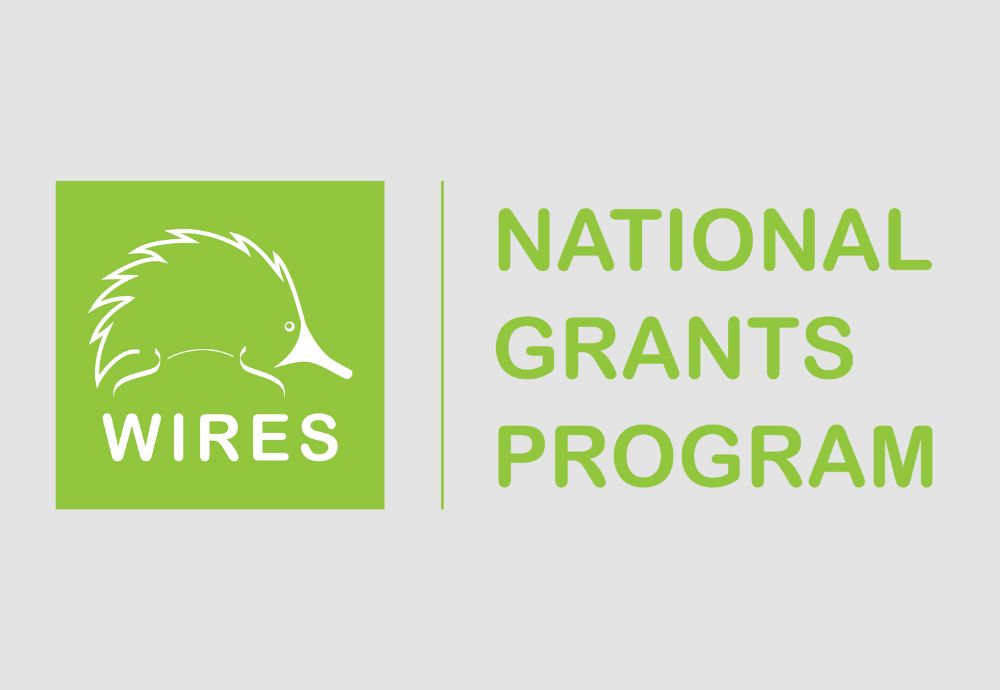
Major Wildlife Grants Program into its second year
Monday, July 11, 2022
The grants are for projects designed to support best practice rescue and rehabilitation of wildlife, native species recovery projects and increase emergency preparedness.
There are four tiers of grants ranging from $1,000 to $50,000 for individual licenced wildlife carers, through to multi-partner collaborations.
“After the successful launch of our National Grants Program in 2022, we are excited to be opening the next funding round to support the wildlife and conservation sector,” said WIRES Projects and Grants Manager, Jennie Murray. “We encourage anyone interested in applying for a grant to attend one of our online information sessions. They are being held on the 19th and 27th of July.”
“We have started to receive fantastic updates from last year’s recipients and look forward to seeing the quality of applications this year,” said Jennie.
There are three special grants being offered each year:
The Mikla Lewis OAM Habitat Restoration and Enhancement Grant – up to $20K
When Mikla Lewis OAM founded WIRES in 1986, little did she envisage that 35 years later the organisation would have expanded from a single branch in Sydney to 28 branches and more than 3500 members. She decided to form WIRES, with the help of a small group of people from various environmental organisations, following a report of an injured ibis in Sydney’s Hyde Park when none of the existing animal welfare bodies had either the jurisdiction or the resources to implement a rescue. Mikla’s foresight and knowledge led to the rescue and rehabilitation of hundreds of thousands of native animals. To this day, she continues to be a dedicated WIRES volunteer.
The Helen George OAM Mammal Grant – up to $20K
From the moment WIRES was founded, Helen George’s expertise in wildlife rescue & care was invaluable. Helen’s involvement with WIRES as a carer, trainer, and mentor lasted more than 30 years, until her passing in 2017. When WIRES received it’s very first call for a wombat in distress, it was Helen’s advice that was sought. Over the years, Helen developed and delivered mammal training courses and trained hundreds of volunteers. This grant is a tribute to the invaluable support and expertise Helen provided to WIRES and is a nod to her particular interest in wombats, macropods and bats.
The Pat Connors Avian Grant – up to $20K
Pat Connors was a long-term member of WIRES. He developed WIRES first rescue and rehabilitation database and call recording system pro-bono and supported it for well over a decade. Pat's contribution enabled WIRES to provide rescue advice and assistance for more than 1.5million animals since its creation. Pat sadly passed away in December 2020 and the grant is to honour Pat's outstanding contribution and his passion for birds.
WIRES is seeking projects that have tangible, positive and ideally long-term outcomes for wildlife.
Key objectives of the grants program include:
· Building capacity and capability for the Australian wildlife rescue and rehabilitation sector
· Improving emergency preparedness and response capabilities
· Preserving species and their habitat through projects leading to long term positive outcomes
· Raising community awareness and inspiring broader community involvement in supporting Australian wildlife rescue, rehabilitation and preservation
Eligible applicants are invited to submit proposals for:
Tier 1: Individually Licenced Wildlife Rescuers and Carers (maximum $1,000)
Tier 2: Licenced Wildlife Rescue and Rehabilitation Organisations (maximum $5,000)
Tier 3: Environmental NGOs and Community Groups (maximum $20,000)
Tier 4: Consortia/Multi-partner Collaborations (maximum $50,000)
Grants open 9am Friday 15th July with applications closing Friday 19th August. For more information, please visit: WIRES National Grants Program
Recent Posts
Statement from WIRES regarding recent animal cruelty case
Walk on the Wild Side this April
WIRES Giving Day raises funds to feed the influx of Spring and Summer rescues
WIRES launches Emergency Response to assist massive numbers of LPS affected Rainbow Lorikeets
Platypus & Plains-wanderer protection
Third Round of WIRES National Grants Opens in July
WIRES Northern Rivers & Clarence Valley welcome new Emergency Responder and Wildlife Ambulance
Birds exposed to Fenthion released back to the wild
Contact media@wires.org.au for enquiries or call 0416 272 153.
For the latest updates on bushfire recovery projects and emergency response
Read WIRES Emergency Recovery Plan and WIRES National Emergency Response Plan
